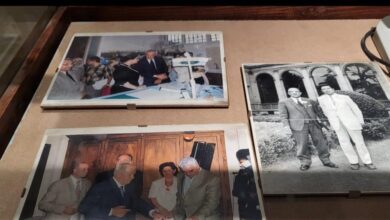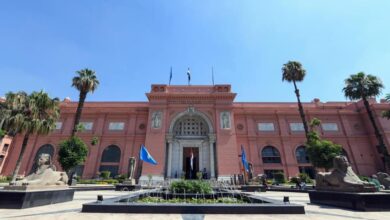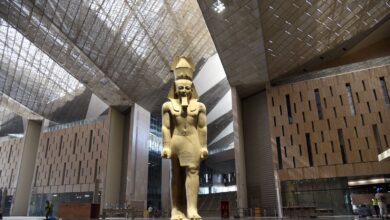For the past few years, Aly Sobhy has been part of a street theatre troupe whose work was one of the reasons you might have dared to think a revolution was possible.
Unsurprisingly, Sobhy was part of every stage of the uprising that began on 25 January. He was often seen in Tahrir Square, where he spent days and nights protesting until president Hosni Mubarak was ousted on 11 February.
After Mubarak’s ouster a few thousand protesters insisted on occupying the sqaure until the dissolution of the notorious state security apparatus, the release of political prisoners and the lifting of Emergency Law.
On 9 March, the military forcibly cleared the square as thugs infiltrated it, intimating protesters with sticks and stones.
Sobhy arrived in the afternoon when he heard of the clashes to check on fellow protesters. When he started to write down the names of those who were being detained, he was arrested by the military.
On 10 March, State Television reported on the clashes, showing footage of detainees, Sobhy included, with arms and sticks next to them.
“I’ve known Ali for a long time,” said Ali Khamees, a close friend and an actor in the same street theatre troupe. “He was like a role model for me in the revolution.”
Before being taken away to detention facilities, Sobhy and other detainees were reportedly tortured at a makeshift military point at the Egyptian Museum, next to the square.
Rami Essam, a 23-year-old artist, was detained on 9 March, taken to the museum, and released hours later. “A group of soldiers dragged me towards the museum’s building and handed me to army officers who tied my hands and legs up and started kicking me all over my body and face. Then they started hitting me on my back and legs with sticks, metal bars, wires, and hoses,” he wrote in a testimonial that he posted on his Facebook page.
His and other accounts have prompted human rights watchdogs to issue statements of condemnation. “The Supreme Military Council has been ignoring credible reports of arbitrary arrest and torture," said Joe Stork, deputy Middle East and North Africa director at Human Rights Watch, in a 11 March statement. "There can be no break from the abuses of the past while security forces–including military personnel–abuse people with impunity." Human Rights Watch collected similar accounts of torture from four people also detained at the museum that day.
An ongoing legal battle has begun on behalf of the missing.
“Since Wednesday, we’ve been chasing the military prosecutor to know the whereabouts of the detainees, but couldn’t get any information,” Raguia Omrani, a lawyer with the Hisham Mubarak Law Center, told Al-Masry Al-Youm.
Omrani said the military prosecutor declined requests from her and other lawyers to attend the detainees' interrogations.
According to her, those arrested on 9 March amount to 173 men and 17 women, all of whom may be charged with the newly created crime of "thuggery."
Military trials are condemned by human rights groups for violating the requirements for fair trials. On 1 March, Amr al-Beheiry, an employee in a food company, was sentenced to five years in prison by a military court in a hearing that lasted less than five minutes. Charged with assaulting a military officer on duty and breaking the curfew, al-Beheiry was arrested when the military forcibly dispersed a sit-in outside the People’s Assembly on 26 February.
On 12 March, activists and detainees’ families gathered at the headquarters of the military prosecutor to inquire about the whereabouts of the prisoners and their fate. A military officer told them that all those arrested on 9 March in Tahrir Square were taken to a military prison in the Hike Step area. It is not known if they will be interrogated or face immediate trials.
Reading out a list of those detained at the Hike Step, a woman who recognized a name burst into tears. “My son was returning from his work to home via Tahrir that day. They took him and called him a thug,” she screamed.
Khamees is equally disturbed by the possibility that his long time friend may face a military trial on charges of thuggery. He recalled, “we love the streets so much and that’s why always wanted to do something real there.” For Khamees, it is still unimaginable that Sobhy will end up charged with thuggery in the very revolution he was part of.




